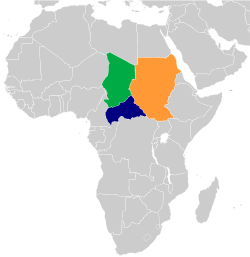 | |
 Chad (green), Central African Republic (blue) and Sudan (orange) | |
| Abbreviation | MINURCAT |
|---|---|
| Formation | 25 September 2007 |
| Type | Peacekeeping Mission |
| Legal status | Inactive (mandate until 31 December 2010) [1] |
Head | José Victor da Silva Angelo |
Parent organization | United Nations Security Council |
| Website | un.org/minurcat |
The United Nations Mission in the Central African Republic and Chad (MINURCAT) was a United Nations peacekeeping mission established by the United Nations Security Council on September 25, 2007 to provide a multidimensional presence of up to 350 police and military personnel to eastern Chad and north-eastern Central African Republic [2]
Contents
The mission comes as a response to the dire situation of an estimated 230,000 refugees from Darfur who continue to flee into bordering eastern Chad and north-eastern Central African Republic (CAR). Armed Sudanese rebel groups have continuously carried out attacks across the Sudanese border, endangering local residents and Darfurian refugees alike.
This followed on from a resolution in July 2007 sending UNAMID into the region [3] and a resolution in August 2006 sending UNMIS there, [4] the Secretary-General drafted a report outlining the shape of the mission he thought should be sent there, [5] as well as received assurance from the European Union of its contribution of troops. [6]
Although the EUFOR Tchad/RCA was originally scheduled to deploy in November 2007, it was delayed until February by a lack of equipment. It reached its Initial Operational Capability on 15 March 2008 and was replaced by UN forces under the same MINURCAT mandate on 15 March 2009. The latest resolution to concern the MINURCAT mandate, Security Council Resolution 1913, extended the stationing of the mission until 15 May 2010 allowing further discussions with the Chadian government which asked for the mandate not be renewed. A further extension was done until the end of 2010.
MINURCAT's mandate officially ended on December 31, 2010. [7]